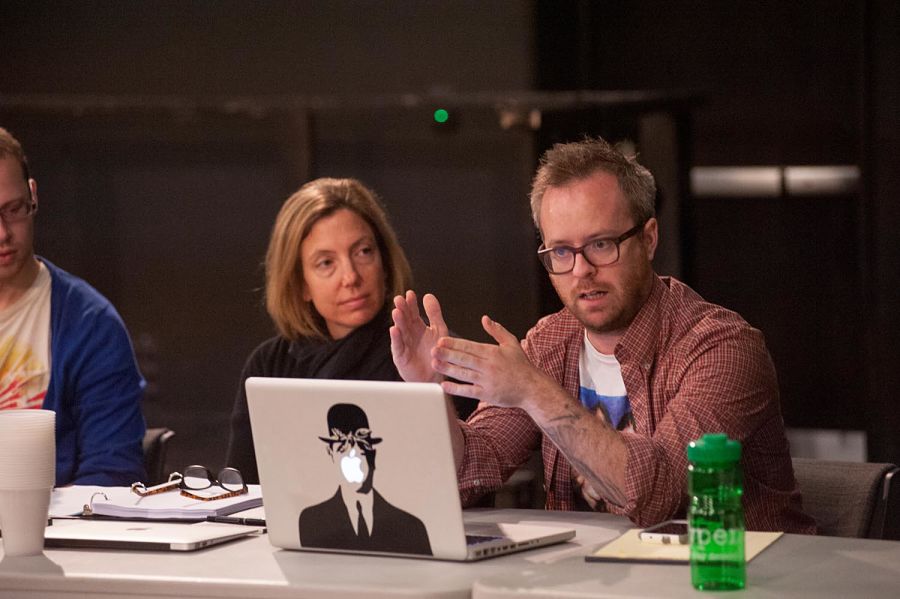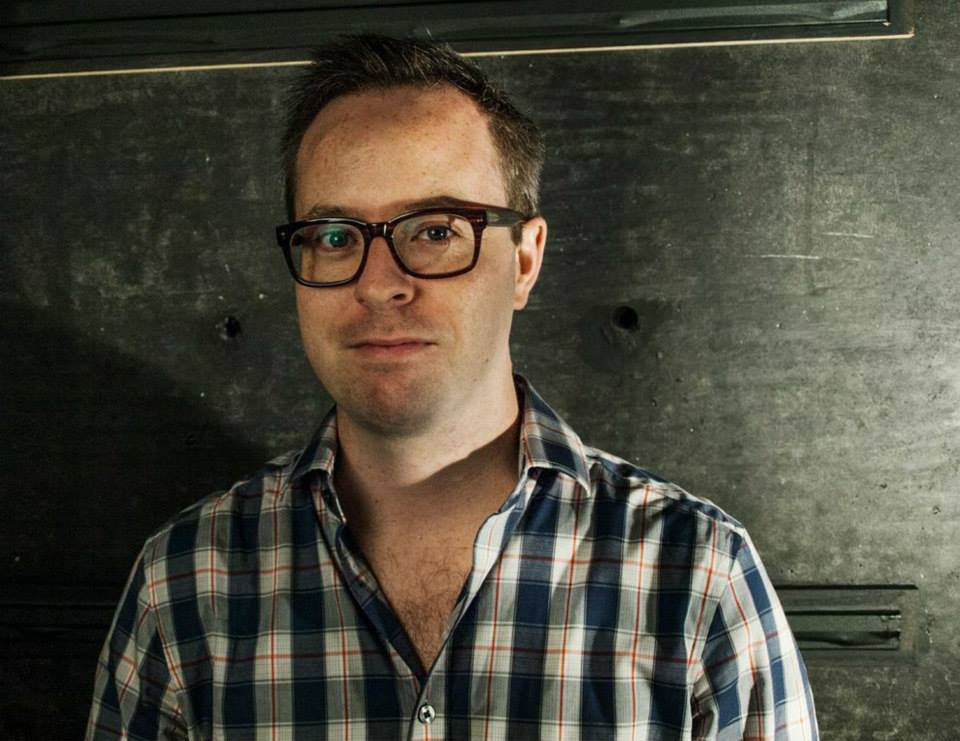PlayPenn is an artist-driven organization, dedicated to improving the way in which new plays are developed. Their most prominent public event is a three-week conference each July in Philadelphia where they develop eight brand new plays by playwrights who are on the forefront of American theater. Each play receives two readings that are free and open to the public. To celebrate this year’s conference, Phindie is running six interviews with prestigious playwrights who have benefited from their experiences with PlayPenn.
David Jacobi, an American playwright, has lived in China, teaching and working in theatre, from 2009 to 2012. His plays have been performed in China and throughout the U.S., including the Peter Jay Sharp Theater, Fringe NYC, Penghao Theatre, and 798 Dashanzi Art District. His work has been developed at Portland Center Stage’s JAW Festival (Mai Dang Lao), Cutting Ball Theater’s RISK IS THIS (Ex Machina) Great Plains Theatre Conference Mainstage (Mai Dang Lao), WordBRIDGE, Kennedy Center MFA Playwright’s Workshop, and PlayPenn (Widower). He is a winner of the Holland New Voices Award, Kennedy Center Theatre for Young Audiences Award, and has been nominated for the Weissburger Award. He received a BFA in Dramatic Writing from Purchase College and an MFA from UC San Diego. David is currently a resident playwright at Pig Iron Theatre Company through the Shank Fellowship. July 5-24, 2016; playpenn.org.

Incubation
Eger: How did you come up with the concept for your play, Widower?
Jacobi: Professional wrestling, for better or for worse, was my introduction to theater. I was always fascinated with the manufacturing of the illusion, but learning more about the industry introduces you to some painful truths about the lifestyles of the performers.
Eger: Describe the stages that your script went through, from your very first draft to the version that you submitted to PlayPenn.
Jacobi: The play started as a ten-minute play about a father and son burning spiders in the New Mexico desert. One day, I challenged myself to take 48 hours and extend the play into a full length. It was there that I created Hattie, the female protagonist. She was the most fun to write, but that created a problem in which the focal character (Jonas, the boy) wasn’t really the focus anymore. The addition of the Exterminator, an existential boogeyman, came out of the Kennedy Center workshop.
Eger: I liked your play Widower a great deal. It is listed on the National New Play Register.
Jacobi: Cast: 3. Genre: comedy, dark comedy + 2 more. Keyword: coming of age, Alcoholism and Drug Abuse + 1 more. [Story:] Jonas is home alone. His drug addict father has disappeared. Hattie, a former professional wrestler who has fallen on hard times, shows up out of the blue. Stuck together in a home in the middle in the New Mexico desert, Jonas and Hattie wrestle with the truth of who they are and the lies they tell to get by. When the Exterminator arrives, Jonas and Hattie soon realize that the only allies they have may be each other. Widower explores what happens when villains turn into heroes, enemies turn into allies, and loss is transformed into something approximating redemption.

Collaborative Process
Eger: You have taken other play development workshops. What made them different from your PlayPenn experience?
Jacobi: I’ve had my work developed with Great Plains Theatre Conference, WordBRIDGE, JAW, Kennedy Center MFA Playwrights Workshop, and a few others. It would take me all day to explain how each one differs from another, but I think a common denominator in all successful and helpful development workshops is the absence of expectation. PlayPenn was really great at letting us know right off the bat that they aren’t looking for us to generate a certain amount of pages, or anything like that. PlayPenn, and other great workshops, just give us the opportunity to explore freely.
Eger: Could you describe the input on your work by your dramaturg, Jeremy Stoller?
Jacobi: Jeremy was extremely generous with his time and his feedback. I usually have a soft spot for dramaturgs, but what I enjoyed most about Jeremy was his inability to say anything but the hard truth, painful or no. He’s also got this amazing talent of saying a lot without being prescriptive.
Eger: What impact did Anne Marie Cammarato, your PlayPenn director, have on the way you rewrote parts of your script?
Jacobi: I loved working with Anne Marie. She isn’t just a director; she’s also a playwright. That made for a great room. She, just like Jeremy, was able to do away with talking about what was working, and instead focus on what wasn’t working, and collaborate on solutions to fix it.
Eger: Tell us about your work with the actors—Anthony Flamminio, D’Arcy Dersham, and Brooke Behmke—especially anything they said that might have helped you in reshaping parts of your play or perhaps rephrasing something.
Jacobi: I’m a thirty-five year old guy writing a play in which the main character is twelve years old. Occasionally I’m going to get the voice wrong, but until I had Anthony in the room, it was hard to figure out what I was getting incorrect. Just by being a 13 year old kid, he was able to provide insight I hadn’t been able to get.
Eger: PlayPenn had invited a large range of theater artists, including stage designers, to work with you.
Jacobi: That design meeting was PHENOMENAL. They put me in a room with a bunch of insanely talented and dedicated designers. One particularly interesting moment was when we discussed a more stripped down version of this play, in which there’s nothing but three actors and a giant stuffed teddy bear. I’ve been stressing a bit about how “prop heavy” this play seems to be; this version of the play is very exciting to me.
Eger: Among playwrights in North America, both Paul Meshejian and Michele Volansky are legendary for nurturing new plays. Could you give examples of how their work shaped part of your script?
Jacobi: Neither Paul nor Michele seem to suffer fools, and they seem to have a pretty well functioning bullshit detector. They don’t go out and say, “Impress us,” but they’re both just so cool, it’s hard not to want to.

Playing at PlayPenn
Eger: Could you tell us a bit about your experience with Anita Castillo-Halvorssen, your intern?
Jacobi: Anita’s great. She’s got a great head on her shoulders, and she’s so incredibly invested in new work.
Eger: While the serious work might have been stressful at times, were there funny, perhaps even hilarious, moments?
Jacobi: There’s a line in the play where Jonas says, “One time, this kid from school, Josh Hooper, broke his arm so bad the bone popped out of the skin.” While in the room, we decided to ask Anthony if he’d like to replace “Josh Hooper” with the name of someone he goes to school with. He enthusiastically agreed, and “Jasper Kekorian” was put in. That name . . . that name is pretty great.
All’s Well that Playwrights Well: Beyond PlayPenn
Eger: What have you discovered about yourself through the PlayPenn process—not only as a playwright, but as a mensch?
Jacobi: I’ve always been more of a listener than a speaker. Writing plays has helped a ton, because it gives purpose to listening. It’s my ideal form of communication.
Eger: What advice do you have for the next generation of playwrights?
Jacobi: Writers block isn’t real. Never stop submitting. Find your tribe. You should only be doing this if (1) you’re unable to stop or (2) you’re absolutely rubbish at everything else.
Eger: Thanks, David. 谢谢你,大卫。
July 5-24, 2016; playpenn.org.
Read a three-part interview with PlayPenn founder Paul Meshejian
- PlayPenn, Theater, and “A comfortable place for misfits”: Interview with founder Paul Meshejian, Part 1
- Everything you always wanted to know about PlayPenn, but were afraid to ask: Interview with founder Paul Meshejian, Part 2
- How to Get Accepted into PlayPenn: Interview with founder Paul Meshejian, Part 3
